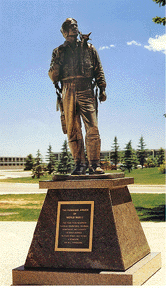This past Friday, October 10, 2008, the National Park Service held a dedication and a grand opening ceremony to officially open the Tuskegee Airmen National Historic Site at Moton Field in Tuskegee, Alabama.
“The Tuskegee Airmen” was the popular name of a group of black pilots who flew with distinction during World War II as the 332nd Fighter Group of the US Army Air Corps. The Tuskegee Airmen were the first African-American military aviators in the United States.
The museum, housed within a converted airplane hangar at Moton Field where the Airmen once trained, is a long overdo permanent tribute to the heroic group of airmen who flew more than 15,000 combat trips throughout Europe, the Mediterranean and North Africa during World War II – all while fighting discrimination on the homefront in the Jim Crow South.
A full news release from the National Parks Service is available here:
http://www.nps.gov/tuai/parknews/national-park-service-opens-tuskegee-airmen-historic-site.htm



